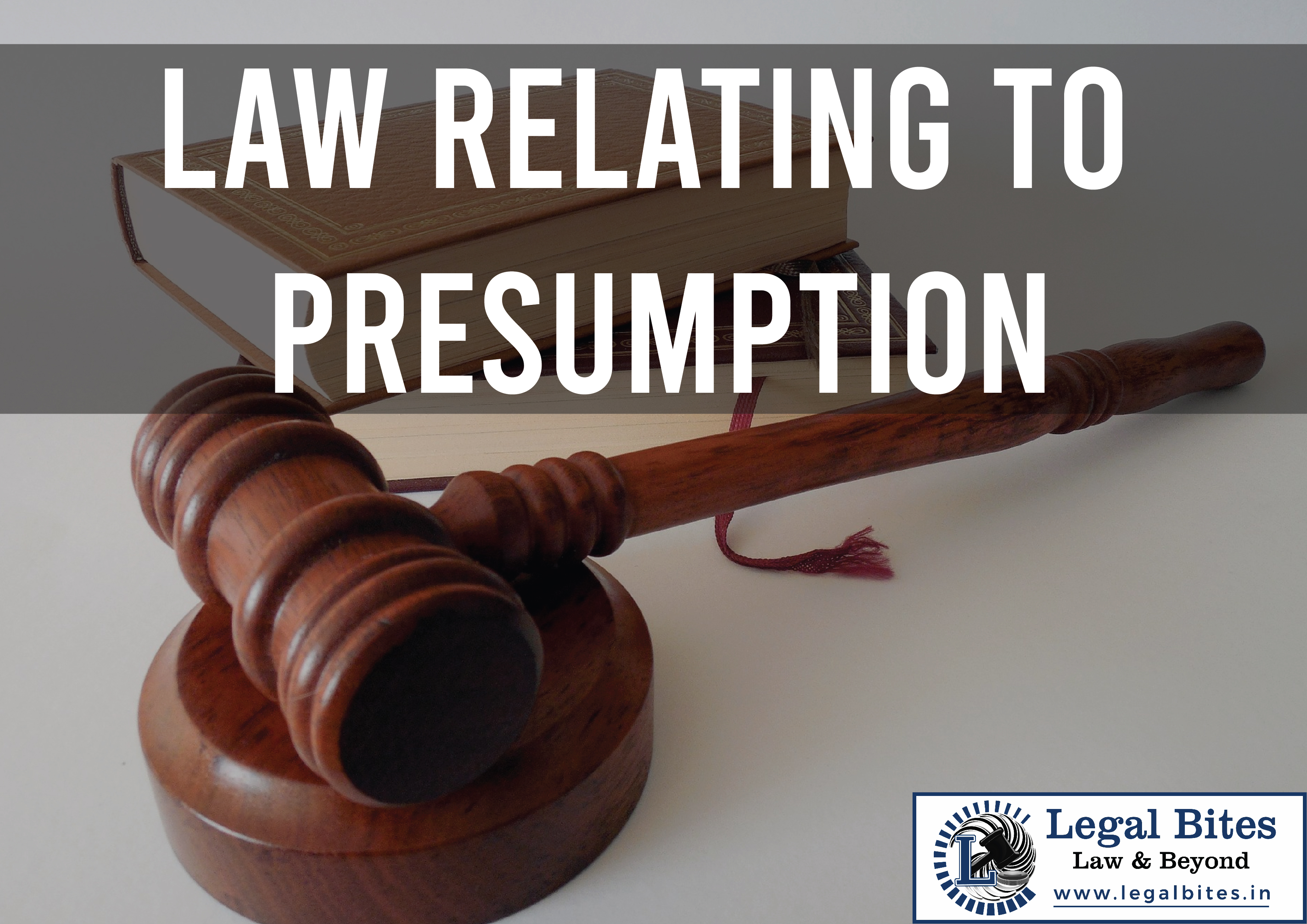This article on 'Law relating to Presumption' is written by Tejas Vasani and discusses the law of presumption under the Indian Evidence Act. I. Introduction The term "presumption" refers to an affirmative or non-affirmative illation pertaining to a doubtful fact or proposition and drawn by following a process of probable reasoning from something substantive.[1] Section 4 of the… Read More »

This article on 'Law relating to Presumption' is written by Tejas Vasani and discusses the law of presumption under the Indian Evidence Act. I. Introduction The term "presumption" refers to an affirmative or non-affirmative illation pertaining to a doubtful fact or proposition and drawn by following a process of probable reasoning from something substantive.[1] Section 4 of the Indian Evidence Act, 1872, enunciates the law of presumption. It defines three phrases- "May presume",...
This article on 'Law relating to Presumption' is written by Tejas Vasani and discusses the law of presumption under the Indian Evidence Act.
I. Introduction
The term "presumption" refers to an affirmative or non-affirmative illation pertaining to a doubtful fact or proposition and drawn by following a process of probable reasoning from something substantive.[1] Section 4 of the Indian Evidence Act, 1872, enunciates the law of presumption. It defines three phrases- "May presume", "Shall presume" and "Conclusive proof".
1. May Presume
As per section 4 of the Evidence Act, wherever it is mentioned that the Court may presume a fact, it may:
- Regard the fact as proved until and unless it is disproved; or
- Call for the proof of the fact
Thus, wherever the words "may presume" have been used, the court has the discretion to either make a rebuttable presumption or call for confirmatory evidence. It must be noted here that the presumption so made is not conclusive or incapable of being rebutted.[2]
2. Shall Presume
Unlike "may presume", wherever the words "shall presume" have been used, the court has to regard a fact as proved unless it is disproved. Thus, the court has to necessarily make a rebuttable presumption regarding the existence or non-existence of a fact.
For disproving a fact so presumed or, in other words, rebutting a statutory presumption, the evidence has to be clear and convincing. It must be such that, by judicial application of mind, it is established that the real fact is not the one that has been presumed.[3]
3. Conclusive Proof
Section 4 of the Evidence Act defines "Conclusive proof" as follows,
"When one fact is declared by this Act to be conclusive proof of another, the Court shall, on proof of the one fact, regard the other as proved, and shall not allow evidence to be given for the purpose of disproving it."
The section provides for non-rebuttable presumptions, that is, presumptions that are conclusive in nature. In the case of Gitika Bagechi v. Subhabrota Bagchi,[4] the husband and the wife were in a relationship for eight years before getting married. After marriage, they lived together in a room for months in complete privacy. The court regarded this fact as conclusive proof of the fact that the marriage had been consummated.
In Umashanker v. State of Chhattisgarh,[5] an eighteen-year-old student was alleged of passing counterfeit currency note of ₹100 to a shopkeeper. Upon investigation, he was found to be in possession of 13 more counterfeit currency notes. The court refused to regard the fact as conclusive proof of the fact that the accused was having knowledge or had reason to believe that the notes were counterfeit.
II. Conclusion
The law relating to the presumption under the Evidence Act provides for rebuttable as well as conclusive presumptions. Presumption of fact may sometimes be essential for establishing the guilt or innocence of an accused and to facilitate effective delivery of justice in a case.
On the other hand, in certain cases, any kind of presumptions may fatally hinder the overall progression of the case. Thus, in cases where presumptions are required to be made but such presumption may be rebuttable, the court "shall presume".
On the other hand, in cases where the court has to decide as to whether it must make a presumption or call for confirmatory evidence, it "may presume". Further, where non-rebuttable conclusive presumptions are required to be made in a case to save the court's time, the court designates a fact as "conclusive proof" of another fact.
Edited by- Akriti
References
[1] Babukhan v. State of Rajasthan, AIR 1997 SC 2960.
[2] Emperor v. Shrinivas, (1905) 7 Bom LR 969.
[3] Heinz India (P) Ltd. v. State of U.P., (2012) 5 SCC 443.
[4] AIR 1966 Cal 246.
[5] AIR 2001 SC 3074.


